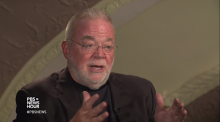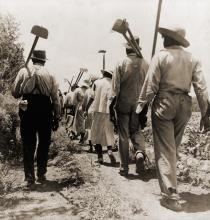Bible

If Haslam signs the bill, the Bible would join a list of state symbols such as the raccoon as the state’s wild animal, the Eastern box turtle as the state reptile, the square dance as the state folk dance, milk as the official state beverage, and the Barrett M82 sniper rifle as the official state rifle, which lawmakers approved earlier in the session.

The state’s Senate Judiciary Committee on March 29 gave the green light to a bill that would make the Bible the official book of Tennessee, The Tennessean reports.

Every now and then Twitter just nails a hashtag, and defends the fundamental value of the Internet. This time, with #MemeHistory, people are pairing a contemporary “meme” with a famous event from history. Although the theme of #MemeHistory isn’t explicitly religious, many Twitter users couldn’t resist turning to the good book for inspiration.
All the greatest pieces of biblical drama are there: Jesus' resurrection, the Garden of Eden, Satan tempting of Jesus.

Bentov, a combat video journalist who was sent out to cover wars and terror attacks, said he developed the Jerusalem Nano Bible “as a way to generate some positive change in the world.”
“For a long time I felt the need to create something that would help fight the evil and the ugliness I witnessed all around me,” he said. “I wanted to leave something good for my kids and the next generations to come.”

Sen. Ted Cruz said he has asked his communications director to resign after spreading a false story on social media about Sen. Marco Rubio.
“Our campaign should not have sent it,” Cruz said Feb. 22 before speaking with supporters at a neighborhood YMCA in Las Vegas.
“That’s why I’ve asked for Rick Tyler’s resignation.”

For some months after he returned from England last year, a Montclair State University professor did not realize what a treasure he had found in a rare books library at Cambridge University.
While abroad, Jeffrey A. Miller, an assistant professor of English at the New Jersey school, had acquainted himself with some of the 70 pages of a notebook that had belonged to Samuel Ward, a 17th century biblical scholar. But it wasn’t until Miller returned home, and made a more thorough study of photographs he had taken of its pages, that he understood how stunning a discovery he had made.
The notebook held draft portions of the most enduring English translation of the Bible: the King James Version, which was published in 1611 and named for the newly ascended King James I.
“I am not even sure I believed it initially,” said Miller, describing the moment when he figured out he had seen draft pages from the most widely read work in all of English, including Shakespeare.

Bruised and battered in body and spirit, many victims of domestic violence are looking to faith communities for guidance. We must do more to make sure our congregations are safe spaces for survivors of abuse. And that starts with naming the sin of domestic violence in our churches and examining how our own sacred texts have been misinterpreted to condone such abuse.
This October—as part of Domestic Violence Awareness Month—we’re featuring a new online series called Troubling Texts: Domestic Violence in the Bible. With thought-provoking commentary from experts, pastors, and emerging scholars, we'll take a hard look at how scripture has been used to justify domestic violence.

Pope Francis’ strident critique of “unbridled capitalism” has turned heads across the globe. Ahead of his upcoming visit to the United States, American politicians, religious leaders, and laypeople are eager to hear how Pope Francis thinks about economics.
Economics correspondent Paul Solman spoke with Jim Wallis and others in a segment for PBS Newshour about why the pope wants us to stop worshiping capitalism.
Jim Wallis explained how Pope Francis’ critique of capitalism matches God’s vision for the world, as well as the ministry and example of Jesus:

THE DOG DAYS OF SUMMER can make for a preaching desert without an oasis in sight. This can be a fine time to take a vacation from the lectionary. Huge swaths of scripture go untreated otherwise—the entire Samson cycle, most of the cursing psalms, most of the gospel of John. One friend spends a portion of every year preaching through blockbuster movies and how they intersect with the scriptures. Another devoted a preaching series to favorite children’s books.
Here in August the lectionary itself seems to take a vacation, visiting the discourse about bread in John’s gospel, inviting us to see every bit of bread, every bite of food, as filled with Jesus. Texts about water invite us to see all water as a sign of the God who creates us in the water of a womb and gives water for our salvation in baptism (an especially apt teaching point for those still sandy-toed from the beach).
A friend’s pulpit has on it “tree of life,” written in Hebrew—inviting all to see trees as reminders of the tree from which our first parents ate fruit forbidden to them, the tree on which Jesus was crucified, and the tree in the City of God whose leaves are for the healing of the nations.

As long as people have been praying, they have also been asking for prayer from one another. In the Bible, the New Testament is full of requests from Paul and others to pray for them; contemporary places of worship often offer time in their services to pray for the specific needs of their parishioners.
A new app called Instapray makes sense as a digital heir to that tradition.

Less than two weeks after a third-grade teacher in Duncan, Okla., distributed Gideon Bibles to her students, the Church of Ahriman, a Satanist church in Oklahoma City, has asked permission to distribute Satanist literature at Woodrow Wilson Elementary School.
Adam Daniels, the church’s leader, said he wanted to give students a copy of Ahrimani Enlightenment, a primer and workbook normally given to new members of the church.
In a letter to the Duncan school district, some 80 miles south of Oklahoma City, Daniels assured administrators that his book is “no where (sic) near as graphic as the Christian Bible.”
Daniels said he has yet to hear back, but he believes equal access laws mean that his church has the right to distribute literature if other religious organizations are permitted to do so.

WHEN I WAS 15, my church youth group was not a safe place. Like most youth groups, there were college-age volunteers who served as counselors and Bible study leaders.
One counselor, Paul, took it upon himself to constantly tell me I wore too much makeup, my clothes were too tight, and that I was a flirt. These actions took place in public for six months while other counselors and students watched and laughed. The interactions came to a head when he commented on my lipstick color and I snapped back at him. He grabbed me, forced me onto his lap, and told me I liked it.
At the time, I just thought Paul was creepy; I now recognize his behavior was sexual harassment. I also recognize that the other members of my youth group, including the leaders, saw his behavior and failed to intervene. Why did this happen? Both Paul’s behavior and the leaders’ silence belong to a larger set of attitudes in our culture—and churches—that allows sexual violence and sexual harassment to become normal, even expected, behaviors.
This set of attitudes is known as “rape culture.” When we fail to confront these toxic attitudes in our churches, we undermine our love for our neighbors, ignore the Bible, and misrepresent God as misogynistic.

Breathlessly describing his new USA Network series “Dig” in a promo, leading man Jason Isaacs promises “everything is based on reality and true.”
To a point.
The new series, which premiered March 5, moves quickly between multiple story lines and locations, bouncing off prophesies and spinning conspiracies around the Second Coming of Christ, the Book of Revelation and the restoration of the Jewish Temple in Jerusalem, where much of the series is filmed.
Throw in a high priest’s magical breastplate, a spotless red heifer, and a doomsday Christian group living in a bunker and the series becomes the would-be love-child of Steven Spielberg and Dan Brown.
And that’s just the first episode.

Most of my life, I’ve heard people preface some sort of argument they want to support with the preface, “The Bible clearly states…”
I’ve come to believe, however, that this is a phrase Christians should eliminate from their vocabulary, for a number of reasons:
- There’s no such thing as un-interpreted scripture.
Legendary preacher and theologian Fred Craddock famously noted that, even if one believes the Bible is inerrant, perfect, or directly handed to humanity from God, there’s still no way to glean an absolute understanding from the texts. After all, we all are imperfect, and as such all that we perceive flows through this imperfect vessel. The good news is that the Bible is full of imperfect vessels still being used for incredible good. So maybe rather than on absolutes, we’re meant to focus more on growth, improvement, and restoration.
- We can use the Bible to make nearly any claim we want.
Did you know “the Bible says” that if my man-jewels are squished irreparably for any reason, I’m barred from heaven (No one whose testicles are crushed or whose male organ is cut off shall enter the assembly of the Lord. Deuteronomy 23:1)? And have you considered that the Bible condones mass killing, or what some might consider genocide (Make ready to slaughter his sons for the guilt of their fathers; Lest they rise and posses the earth, and fill the breadth of the world with tyrants. Isaiah 14:21), or even infanticide (Isaiah 13:15-18)? I can use the Bible to justify slavery (wouldn’t be the first time), keeping a sexual concubine, or to prove why eating shrimp condemns me to hell.
- I’ve never met ANYONE in my life who follows the Bible completely from beginning to end.
I could swear the protesters from Westboro Baptist wear shirts that are a poly-cotton blend, and that some of the fiercest Bible-thumpers out there enjoy a good shrimp cocktail from time to time.

IF A POLL WERE to be taken in North American churches concerning the causes of poverty, the results might be quite revealing. The major cause of poverty is widely assumed to be “underdevelopment.” Other prominent factors are believed to be laziness (we’ve all read about those exemplary ants in Proverbs 6), vices such as drunkenness, and, however subtly and discreetly expressed, the supposed racial and national inferiority of certain peoples. It’s a very comforting worldview, and one that our most popular politicians delight to propagate.
But if you look up “underdevelopment” in a concordance ... you find precisely nothing. The Bible contains a few scattered references attributing certain instances of poverty to laziness, drunkenness, and other assorted causes, but hardly enough to substantiate any of them as the basic cause.
YOU CAN'T TURN AROUND these days in Christian circles without bumping into questions around gays and lesbians and the church. It has become the hottest of all hot potatoes in evangelical Christianity, as it has in much of U.S. and global culture.
Long-term consensus evangelical positions and practices on various aspects of “the gay issue” are being challenged at every turn. Indeed, some have already given way.
It used to be that anyone with same-sex desires was considered willfully perverse; but now many evangelicals acknowledge the clinically/medically recognized category of same-sex attraction (SSA), or sexual orientation, as a mysterious but globally recurring pattern among 3 to 5 percent of the human family.
It used to be that LGBT people were frequent targets of derogatory preaching and teaching, often so fierce that some church folks were motivated in the direction of hatred, contempt, and bullying; but now more and more preachers and teachers are moderating their language so as not to do harm.
It used to be that evangelicals sent those with SSA off to “reparative” or “ex-gay” therapies; but now those harmful and futile “treatments” have been discredited and are fading fast, as evidenced for example by Exodus International’s closure and apology in 2013 and its leader Alan Chambers’ statement that “99.9 percent” of the people they had tried to help had not experienced a change in their sexual orientation. More evangelicals are recognizing the importance of not harming their own gay and lesbian adolescents and family members. Family acceptance and suicide prevention are becoming important concerns.

These days, female television characters can almost do it all. But we, the media consumers and producers, are still deciding if we should let them make mistakes, too.
And I don’t mean just the I-dated-the-wrong-handsome-doctor mistakes, or the I’m-an-overprotective-mother mistakes. I mean the type of mistakes that warrant the label of antihero. Merriam-Webster defines an antihero as “a protagonist or notable figure who is conspicuously lacking in heroic qualities.” Over the past several years, TV has become saturated with male antiheroes. Breaking Bad made a meth dealer Emmy gold, and Dexter garnered a cult following behind a sociopathic vigilante. But hey, boys will be boys.
Girls will be girls, too, if we let them. And girls aren’t always perfect. John Landgraf, president of FX, says it’s much harder to find acceptance for the female antihero: “It's fascinating to me that we just have really different, and I think, a more rigorous set of standards for female characters than we do for male characters in this society.”

A Hymn for This Sunday
This hymn by Carolyn Winfrey Gillette asks the question what does it mean to be a Christian, a church? Whom do we serve? How shall we respond to those in need? It is based on the lectionary passage Matthew 21:23-32 (September 28, 2014). The United Methodist Worship Office has formatted the hymn with the music as a free download.
Once a Father Told His Children
NETTLETON 8.7.8.7 D (“Come, Thou Fount of Every Blessing”)
Once a father told his children,
“Go and do your daily chores.
Go and work out in my vineyard;
All that’s mine will soon be yours.”
One responded, “I won’t do it!”
Then he changed his mind and went.
One said, “Yes! Just send me to it!”
But he went back home again.
...

While there are no biblical texts speaking directly to the issue of money in politics, biblical principles are still relevant, and people of faith have an important role to play in the emerging debate about the future of our democracy. Before exploring those principles, however, it is important to understand the serious issues of inequality currently present in our system, and the correlation between inequality and the money flooding our political system.
The richest 1 percent own more of the nation’s wealth than the bottom 90 percent. The richest one-tenth of one percent have as much pre-tax income as the bottom 120 million Americans.
In Affluence and Influence, political scientist Martin Gilens concludes that, “The preferences of the vast majority of Americans appear to have essentially no impact on which politics the government does or does not adapt.” He details the data throughout his book that clearly demonstrates policy makers are only listening to the wealthy donor class. This situation has been made even worse by the Supreme Court’sCitizens United in 2010, which allowed a huge influx of money to flood our political system after declaring the personhood of corporations.
The Court’s more recent decision in McCutcheon v FEC made matters even worse. Before McCutcheon, one person was able to contribute up to $123,000 to political candidates and parties. In striking down this aggregate limit, the Court paved the way for individuals to contribute more than $3.5 million directly to candidates and party committees. In a report detailing the potential impact of McCutcheon, Demos predicts the decision could result in more than $1 billion in additional campaign contributions by 2020.
